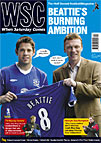 Concerned you haven’t been giving your club enough money online? Seems unlikely, but a group of consultants have been telling clubs just that. A jaundiced Ian Plenderleith reviews their review
Concerned you haven’t been giving your club enough money online? Seems unlikely, but a group of consultants have been telling clubs just that. A jaundiced Ian Plenderleith reviews their review
Do Premiership teams listen to criticism from their fans? Only if the fans picket board meetings and shout loud enough to garner coverage in the national press. Do Premiership teams listen to criticism from fans about the official club website? There’s no empirical proof, but I’d guess the answer is, “Probably not much”. However, if that criticism comes from “an internet consultancy using a holistic approach to add value to a company’s online presence”, it might be a different story.
Late last year, a firm using the grandiose self-description above, net-progress, issued the results of a survey that slammed teams for the mediocre quality of their official websites. However, this was no clarion call for fan-written articles condemning board incompetence and rip-off ticket prices. Rather it took the form of a stiffly delivered, virtual power-point presentation taking clubs to task for committing what counts in the eyes of consultants as the crime of all crimes – failing to maximise revenue opportunities. Translation: not making as much cash as possible.
While a handful of teams were singled out for some praise (Everton, for example, were lauded for providing a Chinese text version of their site for all their, erm, Chinese fans), the overall picture was of cumbersome downloads, annoying pop-ups, broken links and poor accessibility for the visually impaired, which all help prevent site visitors from, say, racking up huge bills at the replica shirt section.
The survey looked at three areas. In terms of quality, the survey found a number of factors (notwithstanding actual content – an area which, perhaps advisedly, was ignored) that could lead to users abandoning a site. These included the “quite long and detailed” registration process that could cause surfers to go to independent media or unofficial club sites instead, and website speed, which the survey, while acknowledging that more and more people are switching to broadband, said remained way too slow for the many users still connected via dial-up modem.
Considering the number of fans abroad that top teams now supposedly either boast or court, clubs were criticised for their limited or non-existent foreign language options, which the survey views as “a missed opportunity”. Sixty per cent of the websites also use pop-ups, which net-progress says is “generally considered to be poor practice” (that is, users swear out loud when they appear on screen), while 75 per cent have “similarly discredited” flash screens.
On visibility, the websites scored better, meaning that if you don’t know a team’s exact web address you’ll find it pretty quickly via a search engine using the team’s name or nickname. However, the report highlights that “many of the websites fail to perform for a search term based on their merchandise”. To the consultancy this again means potential lost cash, or fewer “successful transactions”, to use the report’s language.
Finally, websites were judged as lacking on their accessibility, meaning that for those with poor eyesight, very few club PL websites provide an accessible version with larger font text. Of course the report’s authors were concerned about equal treatment for all potential users, but this is also important because people with poor eyesight – an estimated ten per cent of users – have money, too (or, to quote our friends, a “discretionary budget”). It’s also good for “brand reputation” and because of equality legislation you might lay yourself open to prosecution if this particular market sector gets angry enough from squinting to sue.
The survey is mean with its awards. No club was awarded a net-progress “Gold Standard” (though it’s unclear how coveted these awards are in the football internet industry), only Everton made Silver, and only Charlton and Manchester United received commendations. But then if consultancies concluded everything was pink and rosy they wouldn’t be invited back for another go this time next year.
On the other hand, its targeting of areas that could mean potential cash losses at least speaks the language that most top-flight clubs understand. If these lead to improvements that help fans to browse club websites more easily, then the world will be a better place, albeit by a very slim margin.
It’s instructive, though, that football on the internet is attracting the attention of the same besuited, jargon-spouting leeches that have infiltrated football as a whole. The assumption, or the conclusion, among those who puff themselves up with tagged-on titles such as “consultant” and “agent” is that there is always more money to be made.
In this case, as so often, it’s the fan who’s the target. I can’t speak for the majority of top-flight fans (you’d have to pay me handsomely to get me on a Premiership team’s official site), but it’s still open to question how much cash a club website can generate and how much effort it’s worth for a club to invest in it. Do fans surf their team’s homepage to find out kick-off times and the excuses for last Saturday’s defeat, or are they really there to spend yet more money they haven’t already spent on tickets and travel costs? To find out the answer, we may have to stay tuned for another thrilling and crucial “behaviour analysis and reputation management” survey.
From WSC 216 February 2005. What was happening this month